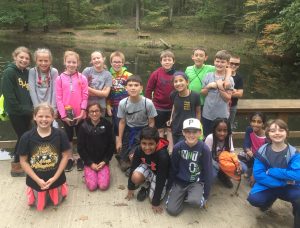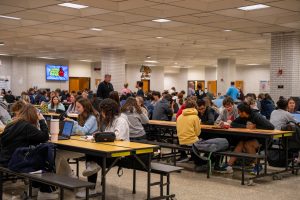Word Smith
September 21, 2017
The Uproar sits down with NASH senior Riley Smith to discuss both her winning submission to the City Theater’s Young Playwrights Contest and what it’s like to be behind the scenes of a play from the author’s perspective.
How did you learn about the contest?
Mrs. Lombardi told me about the contest when I dropped by the GOAL office to ask about a few other writing opportunities that they had. She said that someone from NA had won the contest last year and she thought my chances would be pretty good. Initially, I turned her down and went back to my homeroom because I didn’t have an idea. The second I sat back down, I had an idea so I went back to get the paper.
Regarding the concept you had for the play, was it something that you took inspiration from other ideas you’ve had, or is it something entirely new?
I follow politics fairly closely and this was right after the election, so obviously the idea of American elections and the standard that women and men are held to in these elections was very clear in my mind. I was already thinking about the difficulties that a female candidate deals with on a regular basis that male candidates don’t have to, which then kind of bred the idea for the play.
Could you walk me through a general overview of the plot without spoiling the ending?
Yeah! So, Vicki Lancaster is a gubernatorial candidate for Pennsylvania. However, something that keeps resonating with Pennsylvanian voters is that she doesn’t have a family: she’s not married, she doesn’t have any children… She’s wondering how she can connect to the traditional American lifestyle when she’s not connected in that way and her numbers are starting to fall. Her sister decides that she will ask Vicki’s campaign manager, David, to propose to her on live TV, thereby spicing up the campaign, giving voters something to talk about, and answering the question about family. The only problem is that David has been in love with Vicki for years. As Vicki starts faking this relationship, she realizes that she might feel something for him, too.
How long did writing the play take you?
Initially? Writing probably took me about three days, the rewrites took another week, and then I sent it in after that.
Were there any elements of the plot or characters that you had to cut?
When we went to actual working for production with the City Theater, part of what they looked at was the fact that Vicky’s only 36 in this play, and to be President of the United States, you have to be 35 years old. I initially had her running for President, but we talked and decided that it would be a more realistic goal for her to be running for governor.
How long was it from the time that you submitted the play to when you heard back about it?
Oh… Probably almost three months? I think I submitted it at the end of February or the beginning of March and didn’t find out until the beginning of the summer.
Tell me about production.
We haven’t really gotten all that far yet. The interesting part for me as a writer was going back and forth with Moira Harris, my dramaturge (a literary editor on the staff of a theater who consults with authors and edits texts) and working out the finer details of my play. There were some things I wrote that couldn’t necessarily happen on stage with the budget that the City Theater has for these productions, so that had to change. We also introduced elements of the passing of time through a montage. For me, rewriting to make it more suited for production has been the most interesting part. I also got to attend the auditions and see people trying to figure out who each of my characters were (which was very fascinating), and we’re going to sit through a read-through soon, so that should be fun!
Did you find it harder to edit when you were in rewrites for bringing the play to production or when you were revising the actual script?
Definitely for the production, because I had three or four other people that I had to answer to in terms of how we could work out what I wanted to do and what limitations we had, whereas when I was editing just for the writing it was me, on my own, making those decisions from a storytelling standpoint as opposed to from a production standpoint.
Do you feel that your style of writing was hard to transfer from creative writing to script writing?
I’ve always considered myself more of a fiction writer than anything else, and over the years I’ve been introduced to poetry and now script writing. It’s actually been an easy transition, because one of my weaknesses as a fiction writer is descriptions and trying to make you feel as if you’re in a situation. When you’re writing for the stage, all you have to worry about is dialogue and where people are moving. For the most part, I’m pretty good at dialogue and I can kind of tell where people are going.
How much influence did you have regarding character choices during the audition process?
I only really got to see the audition for one character–Vicky—and they gave me a sheet of paper where I could write down my observations and make a couple of decisions. I was able to say “absolutely not” for a person they might have been considering, but they had to cast my play using the same cast of around ten people for five other productions (the other two high school and three middle school plays). I couldn’t have too much executive choice there, as they had to worry about these other productions as well.
For those of us who have not had the opportunity to see their work brought to life, what can you say from the “other side”?
I haven’t actually seen it go to stage yet, but I did get to sit through a read through where they had a group of volunteer actors come in and take a part. It was a really surreal experience for me… Sitting there around that table with people who had never read anything I’ve written before and trying to become these characters that I’d been thinking about for over four months. It was so fascinating to hear how someone else read a line differently than I had intended, such as having written something that I pictured as sounding defeated, but the actor sounds a little hopeful or optimistic. Being able to see different interpretations of your own work… I think so few people get to experience that and it’s just been incredible for me.
Has having the opportunity to have your play brought to fruition changed what you’re thinking about doing in the future, such as career choices?
I don’t really think so. I definitely would consider pursuing playwriting more than I ever have in the past, but seeing as I wasn’t really planning on writing for a living (at least in the fiction sense), it doesn’t really make that much of a difference.
What are looking forward to most in the future, whether it be with the play or life in general?
For the play, I’m really looking forward to that first stumbling-block rehearsal where they go through everything all at once. I’m going to have an opportunity to witness the blocking and the first readthrough, but seeing it happen for the first time, even if there are mistakes… I’m probably going to cry.
Did you find it hard accepting outside influence regarding decisions such as casting choices or rewrites?
The most fascinating part is that these people have had very different life experiences than me and they’re working on the play from a different perspective than I am, so they were able in many ways to make me consider aspects of my writing that I hadn’t before. For example, I had a throwaway character named Becky who appeared in one or two scenes and sort of just… vanished. I didn’t see that as a problem, but as they were wondering as an audience what happened to her. I eventually added in a line that explains something about her whereabouts at the end of the play. I think it allowed me to consider things that I haven’t been able to before, so definitely accepting that outside information was beneficial to me rather than an obstacle.
I know you mentioned how you are interested in politics in real life, and how that influenced your writing. Were there any other influences in real life that made their way into this play?
I think the core of the play has to do with not just politics but gender politics, and for me gender politics have been a very big part of my life. In general, trying to navigate male-dominated fields like writing or politics is difficult. The cast of my play is two men to three women. Even though it’s a very small cast, that’s a number you don’t see very often. For me, trying to portray women’s stories is something that has always been important and that continues in this play, even if the woman is not necessarily what you would consider a “traditional woman”.
For our last question, what is one piece of advice you would give to people who are struggling with how they want their piece of creative content to come to fruition?
I think Stephen King has an adage about this where he basically says, “Sit down and write a certain amount every day,” and while not all of us can write six pages every day and have a novel ready, you can make sure that you spend a little bit of your time everyday to at least think about the problem you’re having helps me. Even if I’m not feeling creative, having a bit of time set aside allows me to push myself and end up accomplishing more than I thought I could that day.
Don’t miss Riley’s play “Get Out The Vote”, along with the other contest-winning plays, at the City Theatre’s Young Playwrights Festival (October 24th to November 4th).














Mrs Morris • Sep 23, 2017 at 9:51 am
I can’t wait to see it! If any students want to join us for a field trip to see the play on October 25, see Mrs. Lombardi in the GOAL Office.